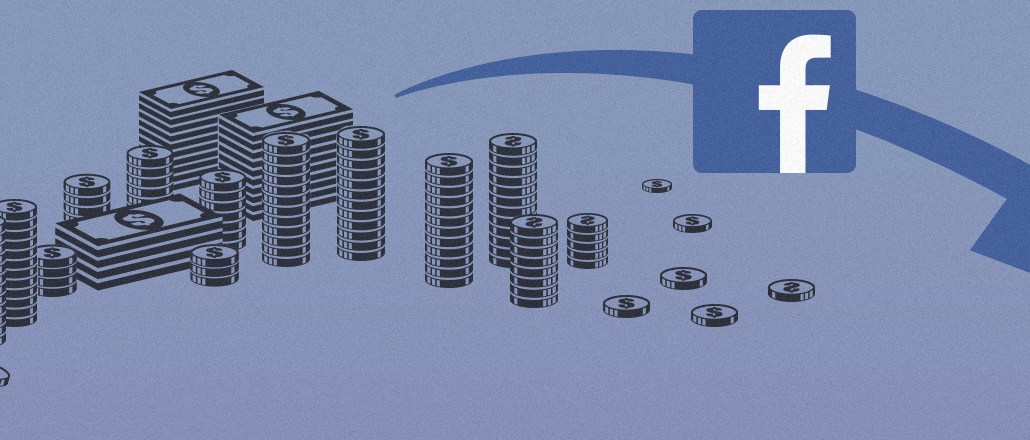Secure your place at the Digiday Media Buying Summit in Nashville, March 2-4

Ben Kunz is vp of strategic planning at Mediassociates, a media planning and buying agency.
We know most of you are still hungover from SXSW, so we’ll punch the key points here: Facebook’s user growth is declining, so news last week that Facebook added a send-friends-money button to its Messenger app is a signal the social network is moving aggressively into the banking world. Which unlocks cool new opportunities for marketers.
OK, slackers, you can bail for aspirin now.
The rest of you, look sharp. On Tuesday, Facebook announced that in the U.S. its popular Messenger app will roll out a payment function, tied to debit cards, so you can message your buddies cold hard cash. Seems like a small thing, but what Facebook is really doing is moving quickly into the multibillion-dollar credit-card payments game.
It has to, because its ad revenue is on the verge of plateauing. In 2014, Facebook made $12.4 billion in revenue, up 58 percent over the prior year. “Our community continues to grow and we’re making progress toward connecting the world,” Mark Zuckerberg wrote in a glowing financial report. Advertising fueled most of this success; last Q4, those little ads in your stream made up 93 percent of all Facebook revenue.
But advertising is always tied to audience eyeballs, and Facebook’s eyes are drying out. In Q4 2014, Facebook had 1.4 billion monthly active users — yee-haw, as they say in Austin — but what about declining growth? Year-over-year growth in users was 260 percent in Q4 2009; 69 percent in 2010; 39 percent in 2011; 25 percent in 2012; 16 percent in 2013; and, um, only 13 percent last Christmas. Yikes. Facebook is on a trajectory to stall in audience eyeballs soon. In business, this is called an “S-curve,” where your early hockey-stick rise eventually flattens like the slow curve atop the S. And investors do not like flat curves.
As a defensive measure, Facebook has moved aggressively to optimize ad revenue from what users it has, pushing hard into mobile (which now accounts for 69 percent of all Facebook ad revenue) and — you’re welcome, brands! — shutting down Facebook brand page organic reach, thus forcing brands to spend instead on Facebook paid advertising. (Deep irony here: marketers, like their own campaigns, have been “optimized.”) Facebook deserves kudos for building the best mobile advertising machine ever created, with incredible targeting data that encourages advertisers to spend there … but it can only push this share-of-wallet game so far. There’s no more room for ads on phones. If the ratio of ads-to-Grumpy Cat-pictures grows too onerous, consumers will bail and head over to Meerkat.
The only way out of an S-curve growth ceiling in business is to find another, bigger S-curve on the horizon. For Facebook, that’s mobile payments. You see, credit card companies make billions of dollars a year by slicing off transaction fees from your Starbucks swipes, and no less a luminary than Jack Dorsey, co-founder of Twitter, launched Square trying to carve off a piece of this game. What’s the difference between a credit card in your pocket that stores a digital code and a Facebook app that does the same thing? Absolutely nothing.
It’s so simple, really. Facebook is already handy on your phone; you use it on average about 65 minutes a day. If Zuck could only convince you to load in your bank information, Facebook could emulate PayPal, which made $7.9 billion in transaction tolls last year by helping people buy stuff online. PayPal has only 162 million active accounts, versus Facebook’s 1.4 billion. Facebook could also displace Visa or American Express, which make billions charging 2 to 3.5 percent in each credit-card transaction. And as we get comfortable using Facebook virtual cash on our phones, it could sell marketers an entirely new type of advertising: coupons or real cash loads that influence us as we check updates inside the mall. “Message alert: Victoria’s Secret has just loaded $10 into your Facebook account, if you act now!”
But first, Facebook will have to convince us to trust it like a bank. Maybe by starting small. And … hey, look! We can now send cash to friends in Messenger!
More in Media

Media Briefing: Turning scraped content into paid assets — Amazon and Microsoft build AI marketplaces
Amazon plans an AI content marketplace to join Microsoft’s efforts and pay publishers — but it relies on AI com stop scraping for free.

Overheard at the Digiday AI Marketing Strategies event
Marketers, brands, and tech companies chat in-person at Digiday’s AI Marketing Strategies event about internal friction, how best to use AI tools, and more.

Digiday+ Research: Dow Jones, Business Insider and other publishers on AI-driven search
This report explores how publishers are navigating search as AI reshapes how people access information and how publishers monetize content.





